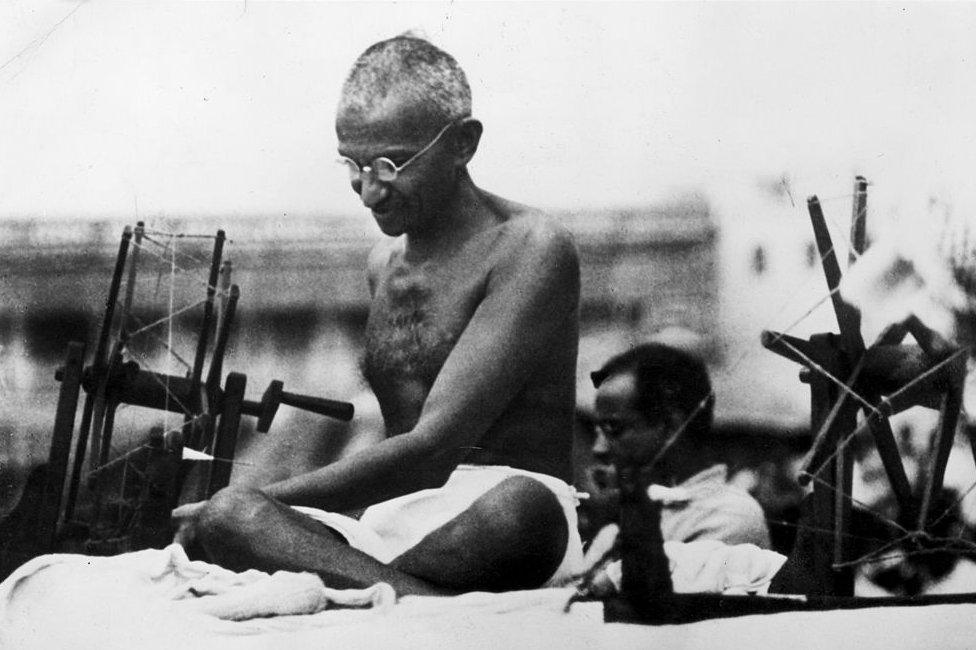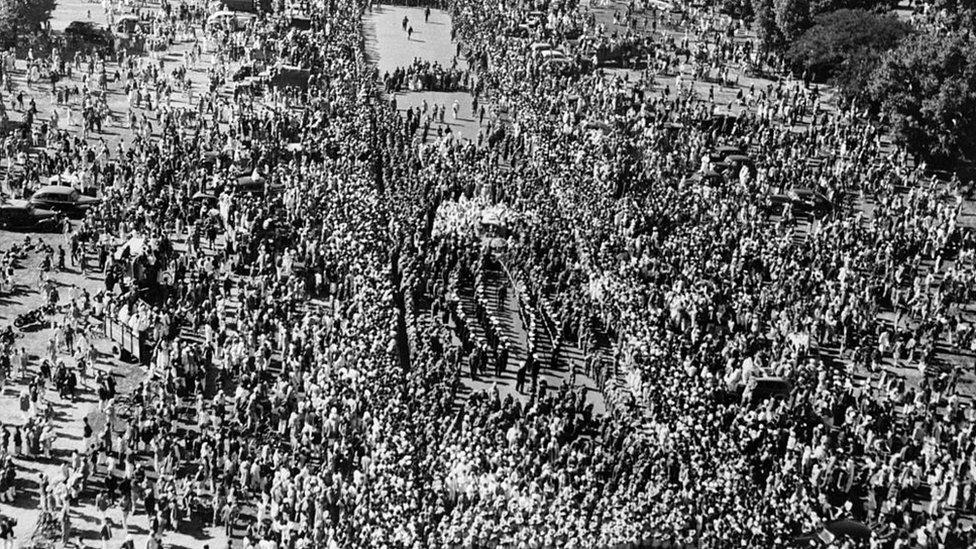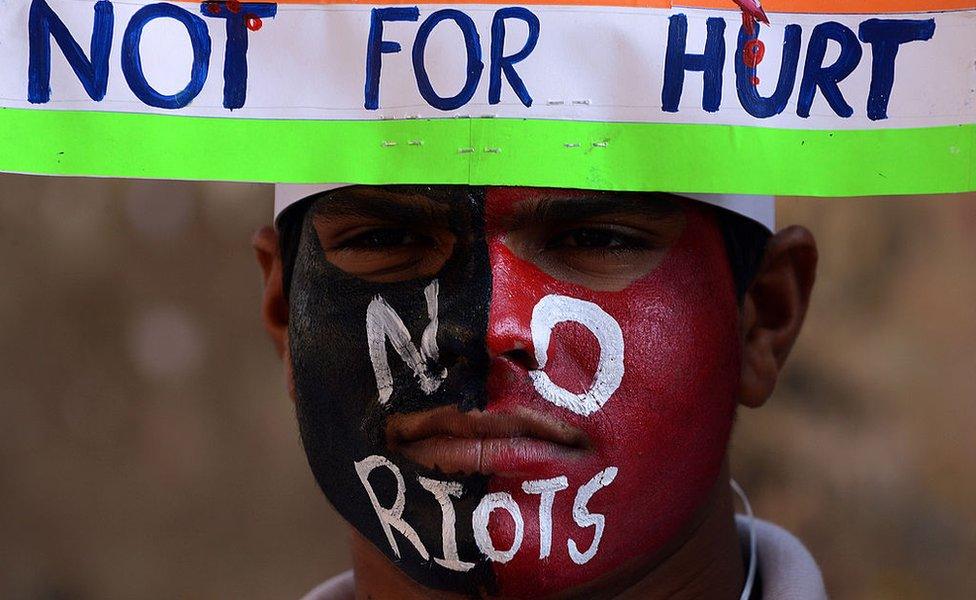Why India's Hindu hardliners want to sideline Mahatma Gandhi
- Published

Handmade cotton yarn or khadi was one of Gandhi's pet themes during India's freedom struggle
Mahatma Gandhi was assassinated on this day 69 years ago but his ideas of Hindu-Muslim unity still haunt India's Hindu hardliners, writes BBC Hindi's Rajesh Joshi.
The discomfort of the Hindu hardline right with Mahatma Gandhi became apparent once again when a senior leader of the governing Hindu nationalist Bharatiya Janata Party (BJP) recently described Prime Minister Narendra Modi as a "bigger brand name" than the iconic leader of India's freedom struggle.
Anil Vij, a senior minister in the BJP government in the northern state of Haryana, also said that Gandhi's picture would eventually be phased out of the currency notes.
His comments came soon after a government department replaced Gandhi's pictures on its calendars and diaries with Mr Modi's. Critics perceived it as a move to slowly replace Gandhi with the prime minister.
The irony was not lost on anyone because the government department in question is responsible for popularising handmade cotton yarn or khadi - one of Gandhi's pet themes during India's freedom struggle.
As the controversy erupted and social media started buzzing with unfavourable comments, the BJP distanced itself from Mr Vij's anti-Gandhi statement.
'Good intentions'
The controversy died down after he agreed to retract his statement in the face of growing outrage.
But this was not the first time that a BJP politician has made anti-Gandhi remarks. Past examples show that many right-wing Hindu leaders never mince words when it comes to criticising Gandhi.
In recent times Sakshi Maharaj, a BJP MP from the northern state of Uttar Pradesh, described Gandhi's assassin Nathuram Godse as a "patriot". Godse's association with the Rashtriya Swayamsevak Sangh (RSS) - which has umbilical ties to the BJP - has been well documented.
The Hindu hardliners who see Modi as their own
Inside a far-right Hindu 'self defence' camp
Way back in 1998, then RSS chief Prof Rajendra Singh praised , externalGodse for his commitment to the concept of Akhand Bharat - a unified India which includes Pakistan, Sri Lanka, Bangladesh and even Myanmar (Burma).
"His intentions were good but he used wrong methods," Mr Singh said.
The biggest issue the RSS has with Gandhi is that he advocated Hindu-Muslim unity while proclaiming himself to be a devout Hindu. The cornerstone of its worldview is Hindu supremacy.

Gandhi was assassinated by a man who saw him as a traitor to India's majority Hindu population
Madhav Sadashiva Golwalkar, one of the founding fathers of the Sangh, described Muslims and Christians, along with the Communists, as an "internal threat to the nation".
Historian and author Ramchandra Guha puts the Hindu right-wing dilemma about Gandhi into perspective. "The RSS was deeply influenced by two Hindu thinkers - Vinayak Damodar Savarkar and Madhav Sadashiva Golwalkar - and both of them deeply detested Gandhi."
In fact, Savarkar was made an accused in the Gandhi murder case - though eventually he was exonerated of all charges.
"His rivalry with Gandhi went back to 1909 when he openly abused Gandhi. While Savarkar believed in violent methods, Gandhi was a pacifist," Mr Guha told the BBC.
"It was much later when the RSS decided to expand into the political arena, that they started saying nice things about Gandhi and included him in their list of 'revered' leaders," he added.
But there is another, probably more serious, reason for their hatred of Gandhi.
Ten days before Godse killed Gandhi, a young Hindu refugee man from Pakistan, Madanlal Pahwa, exploded a bomb on 20 January, 1948, at Delhi's Birla Bhawan where Gandhi was participating in his routine evening prayer.

Gandhi directly challenged the ideologies of India's Hindu rightwing parties
Delhi and many parts of north India were in the grip of Hindu-Muslim violence after the partition of India and Pakistan. A day after Pahwa exploded the bomb, Gandhi described him as a "mere tool" in the hands of Hindu fanatics.
He directly challenged the forces of Hindu hardliners saying, "Don't do this. The Hindu religion is not going to be saved by such acts. I insist that if the Hindu religion is to be saved, it can be saved only through the kind of work I am doing."
No wonder that Praveen Togadia, an important leader of the Vishwa Hindu Parishad (VHP), an affiliated organisation of the RSS, declared during the height of anti-Muslim riots in Gujarat in 2002 that "terrorism came because Gandhi's ideology is being followed in this country".
Mr Togadia, like Mr Modi and Mr Vij, also learnt his politics in the shakhas - the morning military-style drills - of the RSS.
The only difference is that mainstream BJP leaders, especially those holding constitutional posts, avoid openly criticising Gandhi because of a variety of reasons: the compulsions of electoral politics, Gandhi's international stature and his place in the hearts of the Indian people as the "father of the nation".
Still, even though it has been nearly seven decades since Gandhi was assassinated, Hindu right-wing forces feel compelled to question his authority and challenge his idea of Hindu-Muslim unity.
And leaders like Sakshi Maharaj, Anil Vij and Praveen Togadia continue to eagerly oblige.